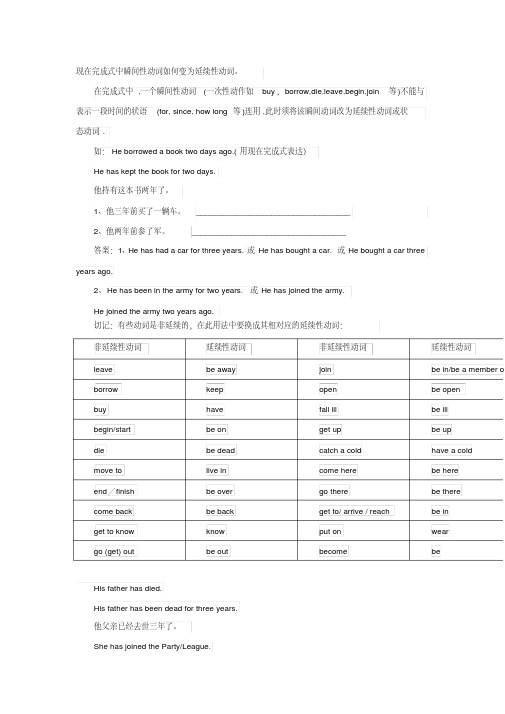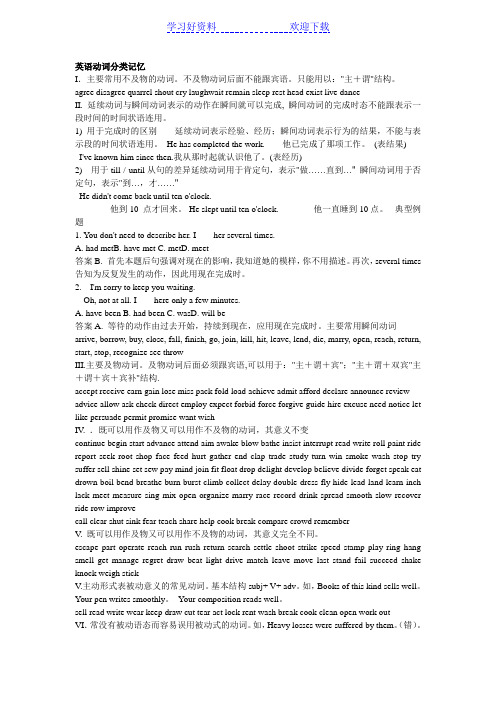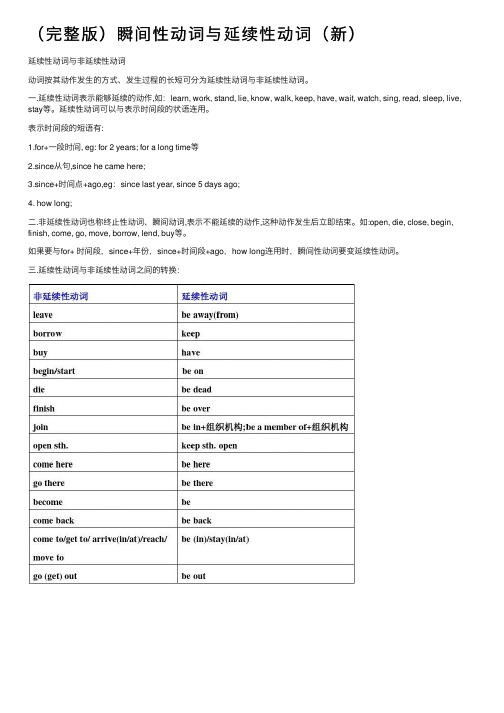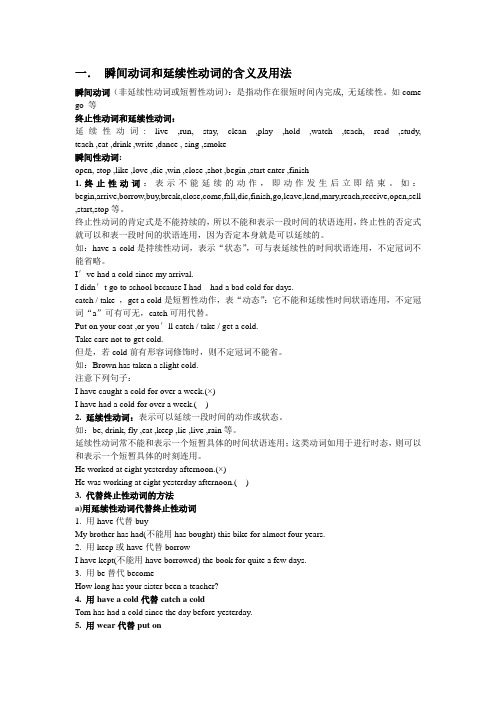(完整版)瞬间性动词与延续性动词(新)
(完整word版)现在完成时中瞬间动词变延续性动词总结,推荐文档

现在完成式中瞬间性动词如何变为延续性动词。
在完成式中,一个瞬间性动词(一次性动作如buy,borrow,die,leave,begin,join等)不能与表示一段时间的状语(for, since, how long等)连用,此时须将该瞬间动词改为延续性动词或状态动词.如:He borrowed a book two days ago.(用现在完成式表达)He has kept the book for two days.他持有这本书两年了。
1、他三年前买了一辆车。
___________________________________2、他两年前参了军。
___________________________________答案:1、He has had a car for three years.或He has bought a car. 或He bought a car threeyears ago.2、He has been in the army for two years.或He has joined the army.He joined the army two years ago.切记:有些动词是非延续的,在此用法中要换成其相对应的延续性动词:非延续性动词延续性动词非延续性动词延续性动词leave be away join be in/be a member o borrow keep open be openbuy have fall ill be illbegin/start be on get up be updie be dead catch a cold have a coldmove to live in come here be hereend/finish be over go there be therecome back be back get to/ arrive / reach be inget to know know put on weargo (get) out be out become beHis father has died.His father has been dead for three years.他父亲已经去世三年了。
动词分类(瞬间动词延续性动词)

英语动词分类记忆I.主要常用不及物的动词。
不及物动词后面不能跟宾语。
只能用以:"主+谓"结构。
agree disagree quarrel shout cry laughwait remain sleep rest head exist live danceII. 延续动词与瞬间动词表示的动作在瞬间就可以完成, 瞬间动词的完成时态不能跟表示一段时间的时间状语连用。
1) 用于完成时的区别延续动词表示经验、经历;瞬间动词表示行为的结果,不能与表示段的时间状语连用。
He has completed the work.他已完成了那项工作。
(表结果)I've known him since then.我从那时起就认识他了。
(表经历)2)用于till / until从句的差异延续动词用于肯定句,表示"做……直到…" 瞬间动词用于否定句,表示"到…,才……"He didn't come back until ten o'clock.他到10 点才回来。
He slept until ten o'clock.他一直睡到10点。
典型例题1. You don't need to describe her. I ___ her several times.A. had metB. have metC. metD. meet答案B. 首先本题后句强调对现在的影响,我知道她的模样,你不用描述。
再次,several times 告知为反复发生的动作,因此用现在完成时。
2.---I'm sorry to keep you waiting.---Oh, not at all. I ___ here only a few minutes.A. have beenB. had beenC. wasD. will be答案A. 等待的动作由过去开始,持续到现在,应用现在完成时。
(完整版)瞬间性动词与延续性动词(新)

(完整版)瞬间性动词与延续性动词(新)延续性动词与⾮延续性动词动词按其动作发⽣的⽅式、发⽣过程的长短可分为延续性动词与⾮延续性动词。
⼀.延续性动词表⽰能够延续的动作,如:learn, work, stand, lie, know, walk, keep, have, wait, watch, sing, read, sleep, live, stay等。
延续性动词可以与表⽰时间段的状语连⽤。
表⽰时间段的短语有:1.for+⼀段时间, eg: for 2 years; for a long time等2.since从句,since he came here;3.since+时间点+ago,eg:since last year, since 5 days ago;4. how long;⼆.⾮延续性动词也称终⽌性动词、瞬间动词,表⽰不能延续的动作,这种动作发⽣后⽴即结束。
如:open, die, close, begin, finish, come, go, move, borrow, lend, buy等。
如果要与for+ 时间段,since+年份,since+时间段+ago,how long连⽤时,瞬间性动词要变延续性动词。
三.延续性动词与⾮延续性动词之间的转换:例:(1)他死了三年了。
误:He has died for three years.正:He has been dead for three years.正:He died three years ago.正:It is three years since he died.正:Three years has passed since he died.(2) 他来这⼉五天了。
误:He has come here for five days.正:He has been here for five days.正:He came here five days ago.正:It is five days since he came here.正:Five days has passed since he came here. (1)、(2)句中的die、come为终⽌性动词,不能与表⽰"段时间"的状语连⽤。
延续性动词与瞬间动词的转换

不规则动词AAA 型AAB型原型过去式过去分词原型过去式过去分词hurt hurt hurt beat beat beatenlet let letcost cost costcut cut cut ABA型hit hit hit 原型过去式过去分词put put become becameputbecomeset set set 放,置,摆放run ranrunshut shut shut come camecomeread read readspread spread 伸开,展开,传播spreadABC型原型过去式过去分词原型过去式过去分词be was, were been mistake mistook mistaken 误会,看错bear bore born 承受,忍受wake wokewoken 醒来,弄醒began begun wear worebeginwornblew blown ride rodeblowriddenbroke broken rise rosebreakrisenchoose chose chosen 选择ring rang rung did done shine shonedoshonedrawn shake shookdraw drew shaken摇,晃drive drove driven sing sangsungdrink drank drunk swim swamswumeat ate eaten show showedshownfly flew flown see saw seen forget forgot forgotten speak spokespokenfall fell fallen steal stole stolen 偷give gave given take took taken grow grew grown throw threwthrowngo went gone write wrotewrittenhide hid hidden 隐藏,躲避know knew knownlie lay lain 躺(lying) (lie “说谎”过去式 lied,过去分词lied,现在分词lying)ABB型过去式过去分词原型过去式原型过去分词brought brought mean meant bringmeantbought bought meet met buy metbuilt built make made buildmadeburnt/burned burnt/burned 燃烧,晒伤pay paid burnpaidcaught caught say said catchsaiddug dug shoot shot digshotdream dreamed/dreamt dreamed/dreamt sit satsatfeed fed fed 喂send sent sentfeel felt felt sleep slept sleptfight fought fought smell smelled/smelt smell/smelt 闻find found found speed sped sped 急行,加速hear heard heard spend spent spenthold held held spell spelled/spelt spelled/spelt 拼写have/has had had stick stuck stuck 将. ..刺入hang hung hung 悬挂stand stood stoodkeep kept kept sweep swept sweptlay laid laid 放置,搁,下(蛋)teach taught taughtlose lost lost tell toldtoldlead led led think thought thoughtlearn learned/learnt learned/learnt win won wonleave left left understand understood understood 理解lend lent lent 借(出)light light/lit light/lit 点火,点燃。
瞬间动词与延续性动词

__________ I have bought this book for three months.x had √ 1.直接转化成延续性动词 1.直接转化成延续性动词
buy
have
catch (get) a cold
以上三种表示方法适用于所有瞬间动词。 以上三种表示方法适用于所有瞬间动词。 另外,还可用其它表示方法,但只适用于部 另外,还可用其它表示方法, 分瞬间动词。 分瞬间动词。具体办法是将瞬间动词转化为表延 续的动词或者表状态的be+名词 形容词或副词/ 名词/ 续的动词或者表状态的be+名词/形容词或副词/ 介词短语等。 介词短语等。
瞬间动词可以用于现在完成时,但不能和表 瞬间动词可以用于现在完成时, 示一段时间的状语连用。如可说“He has left.”但 示一段时间的状语连用。如可说“ left.”但 不能说“ years.” 不能说“He has left for three years.” 如果要表达 他已走了三年了”可用以下几种表达法: “他已走了三年了”可用以下几种表达法: ago,使用一般过去时 使用一般过去时。 一、用ago,使用一般过去时。 He left here three years ago. ago. +一段时间 一段时间+ 二、用“It is +一段时间+since +一般过去时从句 ” It is three years since he left here. 一段时间+ 三、用“ 一段时间+have/ has passed + since + 一 般过去时从句” 般过去时从句” Three years have passed since he left here.
瞬间动词和延续性动词

一.瞬间动词和延续性动词的含义及用法瞬间动词(非延续性动词或短暂性动词):是指动作在很短时间内完成, 无延续性。
如come go 等终止性动词和延续性动词:延续性动词: live ,run, stay, clean ,play ,hold ,watch ,teach, read ,study, teach ,eat ,drink ,write ,dance , sing ,smoke瞬间性动词:open, stop ,like ,love ,die ,win ,close ,shot ,begin ,start enter ,finish1.终止性动词:表示不能延续的动作,即动作发生后立即结束。
如:begin,arrive,borrow,buy,break,close,come,fall,dic,finish,go,leave,lend,mary,reach,receive,open,sell ,start,stop等。
终止性动词的肯定式是不能持续的,所以不能和表示一段时间的状语连用,终止性的否定式就可以和表一段时间的状语连用,因为否定本身就是可以延续的。
如:have a cold是持续性动词,表示“状态”,可与表延续性的时间状语连用,不定冠词不能省略。
I′ve had a cold since my arrival.I didn′t go to school because I had had a bad cold for days.catch / take ,get a cold是短暂性动作,表“动态”:它不能和延续性时间状语连用,不定冠词“a”可有可无,catch可用代替。
Put on your coat ,or you′ll catch / take / get a cold.Take care not to get cold.但是,若cold前有形容词修饰时,则不定冠词不能省。
如:Brown has taken a slight cold.注意下列句子:I have caught a cold for over a week.(×)I have had a cold for over a week.( )2. 延续性动词:表示可以延续一段时间的动作或状态。
短暂性动词和延续性动词
短暂性动词和延续性动词可以从字面上理解,持续的动作就是延续动词,反之就是瞬间动词(短暂动词),这个有这种感觉还是很好理解的,你看看下面的浅谈吧延续性动词:live,run,stay,clean,play,hold,watch,teach,read,study,teach ,eat,drink,write,dance, sing,smoke瞬间性动词:open,stop,like,love,die,win,close,shot,begin,startenter,finish1、终止性动词:表示不能延续的动作,即动作发生后立即结束。
如:begin,arrive,borrow,buy,break,close,come,fall,dic,finish,go ,leave,lend,mary,reach,receive,open,sell,start,stop等。
终止性动词的肯定式是不能持续的,所以不能和表示一段时间的状语连用,而终止性的否定式就可以和表一段时间的状语连用,因为否定本身就是可以延续的。
如:have a cold是持续性动词,表示“状态”,可与表延续性的时间状语连用,不定冠词不能省略。
I′ve had a cold since my arrival(到达n.).I didn′t go to school because I had had a bad cold for days. catch a cold是短暂性动作,表“动态”:它不能和延续性时间状语连用,不定冠词“a”可有可无,catch可用take,get代替。
Put on your coat,or you′ll catch/take/get a cold.Take care not to get cold.但是,若cold前有形容词修饰时,则不定冠词不能省。
如:Brown has taken a slight cold.注意下列句子:I have caught a cold for over a week.(×)I have had a cold for over a week.( )2、延续性动词:表示可以延续一段时间的动作或状态。
英语知识 _ 初中英语,延续性动词和瞬间性动词的用法
一、延续性动词延续性动词,表示的动作不但可以延续,而且可以产生持久的影响。
常见的这类动词有:b e,h a v e,ke e p,k n o w,l e a r n,l i e,l i v e,re a d,s i n g,s l e e p,s t a n d,s t a y,w a i t,w a l k,w a tc h等。
延续性动词的用法很广,但常见于现在完成时中的句子中,且常与f o r,h o w,l o n g,s i n c e 等引导的表示一段时间的状语或状语从句连用。
例如:I h a v e l e a r n e d m o re t h a n1000C h i n e s e w o rd s s i n c e I c a m e t o C h i n a.自从来到中国,我已经学会了l千多个汉字。
I h a v e ke p t t h e p i c t u re f o r a b o u t t h re e y e a r s.。
这张画我保存了大约三年二、瞬间性动词瞬间性动词,又称为终止性动词或非延续性动词,它表示的动作不能延续,也就是说动作一旦发生就立即结束,并产生某种结果。
常见的这类动词有:a c c e p t,a r r i v e,b ec o m e,b e g i n,b o r ro w,b re a k,b u y,c a tc h,c l o s e,c o m e,d i e,e n d,f a l l,f i n i s h,g e t,g i v e,g o,j o i n,l e a v e,p u t,re a c h,re c e i v e,sh u t,s t a r t,s t o p等。
用在现在完成时要注意下面三点:①瞬间性动词可直接用来表示某一动作的完成。
例如:T h e y h a v e re a c h e d S h a n g h a i.他们已经到达了上海。
现在完成时中瞬间动词变延续性动词总结
现在完成时中瞬间动词变延续性动词总结现在完成时是英语语法中常见的一种时态,它表示动作或者状态在过去某个时间开始,持续到现在,或者已经完成的时间段内发生。
在现在完成时中,瞬间动词有时会变成延续性动词,这在英语语法中是一个比较有趣的现象。
下面来分析一下为什么会这样。
1. 什么是瞬间动词和延续性动词瞬间动词通常指的是那些比较短暂的、没有持续时间的动作,通常在句子中使用简单过去时态。
比如,"I saw a movie",这个动作只发生了一次,没有继续的过程。
而延续性动词常常表达的是可以持续一段时间的动作或状态,比如"teach",“run”,“live”等。
在句子中通常使用进行时态。
2. 瞬间动词变成延续性动词的情况在现在完成时中,瞬间动词有时会变成延续性动词。
这种情况通常出现在以下几种情况中:第一种情况,瞬间动词变成了有一个延续的结果的动词,比如"break","finish"和"lose"。
这些动词的结果可以一直持续到现在,因此它们在现在完成时中会变成延续性动词。
比如,"I have broken my arm",意思是我的手臂已经断了,这个状态可以持续到现在。
第二种情况,瞬间动词描述的动作发生了多次,这时候它会被视为是一个持续性的动作。
比如,"I have seen that movie three times",意思是我已经看过那部电影三次了,这个动作发生了多次,因此会被视为是延续性的动作。
第三种情况,瞬间动词变成了一个过程中的动作,这个动作可以持续一段时间。
比如,"I have been to Paris",这个动作是一个瞬间的动作,但是在这个语境中,它变成了一个动作过程中的一部分,这个过程可以持续一段时间。
3. 瞬间动词变成延续性动词的影响在英语语法中,瞬间动词变成延续性动词有时候会导致一些语法错误和表达上的混淆。
(2021年整理)常用瞬间动词变延续性动词表
常用瞬间动词变延续性动词表编辑整理:尊敬的读者朋友们:这里是精品文档编辑中心,本文档内容是由我和我的同事精心编辑整理后发布的,发布之前我们对文中内容进行仔细校对,但是难免会有疏漏的地方,但是任然希望(常用瞬间动词变延续性动词表)的内容能够给您的工作和学习带来便利。
同时也真诚的希望收到您的建议和反馈,这将是我们进步的源泉,前进的动力。
本文可编辑可修改,如果觉得对您有帮助请收藏以便随时查阅,最后祝您生活愉快业绩进步,以下为常用瞬间动词变延续性动词表的全部内容。
常用瞬间动词变延续性动词表①have arrived at/in sp, got to/reached sp, come/gone/ moved to sp→have been in sp②have come/gone back, returned→have been back③have come/gone out→have been out④have become→have been⑤have closed/opened→have been closed/open⑥have got up→have been up⑦have died→_have been dead⑧have left sp→__have been away from sp⑨have fallen asleep/gone to sleep→have been asleep⑩have finished/ended/completed→_have been over⑪have married→have been married⑫have started/begun to do sth→have done sth⑬have begun→_have been on⑭have borrowed→_have kept⑮have bought→have had⑯have lost→haven't had⑰have put on→have worn⑱have caught/got a cold→have had a cold⑲have got to know→have known⑳have gone to→have been inhave joined/taken part in the league/the Party/the army→have beena member of the league/the Party/the army, have been in the league/the Party/the army, have been the Party’s member/the league member/the soldier。
- 1、下载文档前请自行甄别文档内容的完整性,平台不提供额外的编辑、内容补充、找答案等附加服务。
- 2、"仅部分预览"的文档,不可在线预览部分如存在完整性等问题,可反馈申请退款(可完整预览的文档不适用该条件!)。
- 3、如文档侵犯您的权益,请联系客服反馈,我们会尽快为您处理(人工客服工作时间:9:00-18:30)。
延续性动词与非延续性动词
动词按其动作发生的方式、发生过程的长短可分为延续性动词与非延续性动词。
一.延续性动词表示能够延续的动作,如:learn, work, stand, lie, know, walk, keep, have, wait, watch, sing, read, sleep, live, stay等。
延续性动词可以与表示时间段的状语连用。
表示时间段的短语有:
1.for+一段时间, eg: for 2 years; for a long time等
2.since从句,since he came here;
3.since+时间点+ago,eg:since last year, since 5 days ago;
4. how long;
二.非延续性动词也称终止性动词、瞬间动词,表示不能延续的动作,这种动作发生后立即结束。
如:open, die, close, begin, finish, come, go, move, borrow, lend, buy等。
如果要与for+ 时间段,since+年份,since+时间段+ago,how long连用时,瞬间性动词要变延续性动词。
三.延续性动词与非延续性动词之间的转换:
例:(1)他死了三年了。
误:He has died for three years.
正:He has been dead for three years.
正:He died three years ago.
正:It is three years since he died.
正:Three years has passed since he died.
(2) 他来这儿五天了。
误:He has come here for five days.
正:He has been here for five days.
正:He came here five days ago.
正:It is five days since he came here.
正:Five days has passed since he came here. (1)、(2)句中的die、come为终止性动词,不能与表示"段时间"的状语连用。
那么,应如何正确表达呢?可以采用下面的四种方法:
(1)将句中终止性动词转换为相应的延续性动词, 如上面两例中的第一种正确表达方式.
(2)将句中表示"段时间"的状语改为表示过去确定时间的状语,如下面两例中的第二种正确表达
方式。
(3)用句型"It is+段时间+since..."表达原意,如上面两例中的第三种正确表达方式。
(4)用句型"时间+has passed+since..."表达原意,如上面两例中的第四种正确表达方式。
四、终止性动词可用于现在完成时否定式中,成为可以延续的状态,因而可与表示一段时间的
状语连用。
如:1.He hasn't left here since 1986.
2.I haven't heard from my father for two weeks.
五、终止性动词的否定式与until/till连用,构成"not+终止性动词+until/till ..."的句型,意为"
直到……才……"。
如:1. You can't leave here until I arrive.直到我到了,你才能离开这里。
2. I will not go to bed until I finish drawing the picture tonight.今天晚上直到我画完画,我才
上床睡觉。
六、终止性动词可以用于when引导的时间状语从句中,但不可以用于while引导的时间状
语从句中。
when表示的时间是"点时间"(从句谓语动词用终止性动词),也可以是"段时间"(从句谓语动词用延续性动词)。
而while表示的是一个较长的时间或过程,从句谓语动词用延续性动词。
如:1. When we reached London, it was twelve o'clock. (reach为终止性动词)
2. Please look after my daughter while/when we are away. (be away为延续性动词短语)
七、终止性动词完成时不可与how long连用(只限于肯定式)。
如:误:How long have you come here?
正:How long have you been here? 正:When did you come here?
补充练习:
1.When he arrived at the bus stop, the bus ___ for 20 minutes.
A. has left
B. had left
C. has been away
D. had been away
2. I _____ the League for 5 years so far.
A. joined
B. have joined
C. have been in
3.The factory _____since the February of 1988.
A . has been open B. has opened C. was open D. opened
4. Mary and Rose _______friends since they met in 2000.
A. have made
B. have been
C. made
D. have become
5.You mustn't ____until he comes back.
A. be away
B. leave
C. be left
6.The meeting _______ for a week now.
A. has finished
B. has ended
C. has been over
7.Miss Gao ______ this school for nearly 5 years.
A. has been in
B. has come to
C. has taught
8.Ben ______ a teacher for 4 years .
A. has been
B. has become
C. was
D. became
9. I ______ home for a week.
A. have returned
B. have been back
C. returned
10. How long _______ he ________ ?
A. died
B. has, died . has, been dead
11.He_____at eight yesterday afternoon.
A. slept
B. was sleeping
C. has sleep
D. had slept
12.He ________ the car for a week.
A. bought
B. has bought
C. has had
13.-----How long _____ you _____ ill ? -----Two weeks.
A. did fall
B. have, fell
C. have, been
14.Since 2000, he _____ his hometown.
A. has left
B. has moved away
C. has been away from
15.I'll lend you the book , but you can only ____ it for 2 days.
A. borrow
B. keep
C. take
16.The bus ______ on the road for 2 hours so far.
A. has stopped
B. stopped
C. has been
17.Are you _____ the jacket these days?
A. wearing
B. putting on
C. dressing
D. on
18. He ________ foe 2 hours.
A. got up
B. has got up
C. has been up
19. Tom is ill in hospital. He _______ a cold for several days.
A. is
B. catches
C. has caught
D. has had
20. ----- How long can I ______ the book? ------ Two weeks.
A. borrow
B. lend
C. get
D. keep
1---5 D C A B B; 6---10 C A A B C; 11---15 B C C C B; 16---20 C A C D D。
